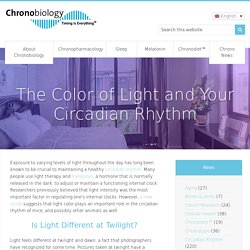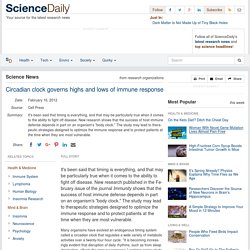

Your brain gets ready to think when you are supposed to be awake. Your body fights cancer (with natural killer cells) when you are asleep, in the dark, at the right time, producing melatonin (a sleep hormone).
Your master clock is set by the light/dark cycle and other "time givers" such as eating. When your clocks become disconnected from each other your body doesn't work well.
Regulating Circadian Rhythm (and why that's important)
Optimal health through circadian rhythms - Hack your gut. Optimal health is something we all strive for.

Some of us may not want to work hard for it, but who doesn’t want to look, feel, and perform at the top of their game? There is so much information out there on what constitutes a healthy lifestyle. Recently I posted an infographic to Facebook. From a study in the journal Nature, this infographic shows how time-restricted eating promotes optimal health. If you’re not familiar with the practice, time-restricted eating means restricting your food to a 12 hour period or less. There is a ton of evidence in mice and other mammals showing many benefits to this practice. People were a bit confused on the graphic and asked for an explanation of its meaning.
Products to Improve Circadian Rhythm. Eating Time and Circadian Rhythm. Physical Activity and Circadian Rhythm. Light at Night and Circadian Rhythm. The Gut Microbiome and Circadian Rhythm. Circadian Rhythm: How it Works. Circadian Rhythm and the Brain.
Circadian Rhythm and Organs. Circadian Rhythm and Cells in the Body. Circadian Rhythm and Mental Health. Circadian Rhythm Disruption and Disease. How circadian clocks communicate with each other. Multiple biological clocks control the daily rhythms of physiology and behavior in animals and humans.

Whether and how these clocks are connected with each other is still a largely open question. A new study now shows that a central clock governs the circadian rhythms in certain cases. Whether fly, mouse or human, circadian clocks are the central mechanisms that drive circadian rhythms in all animals. However, the notion of one, central clock regulating the timing of all the body's processes is not true. Rather, most organisms have a multitude of circadian clocks: a central clock in the brain and various peripheral clocks in the organs and systems. Yet, it is still largely unknown how these clocks communicate with each other, how they synchronize and whether the central clock sets the time for all other units. Chronobiology - History, Findings and Advancements of Chronobiology. Journal of Biological Rhythms: SAGE Journals. Signs That You Have a Circadian Rhythm Sleep Disorder - Sleep.org. If you have a hard time falling asleep and waking up when you need to, you might have what’s known as a circadian rhythm sleep disorder.

Typically, your body clock regulates a regular daily rhythm of temperature and hormone levels that—combined with other factors like light exposure, meals, and exercise—tells you when it’s time to sleep at night and be awake during the day. Sometimes, however, the rhythms get off course, resulting in poor sleep and daytime drowsiness.
There are a variety of these disorders—and if one sounds like it might be what you have, talk to your doctor. Delayed Phase Sleep Phase Disorder Called DSP for short, this type of circadian rhythm is what’s experienced by “night owls” or those who tend to stay up until 1:00am or later. Advanced Sleep Phase Disorder The opposite of DSP, ASP is what’s experienced by extreme “early birds” who wake up between 2:00am and 5:00am. Jet Lag Sound familiar? Shift Work Disorder. Circadian Rhythms. Caffeine at night delays human circadian clock: Double espresso before bedtime induces 40-minute time delay in internal clock.
It's no secret that slugging down caffeinated drinks in the evening can disrupt sleep.

But a new study led by the University of Colorado Boulder and the Medical Research Council's Laboratory of Molecular Biology in Cambridge, England shows for the first time that evening caffeine delays the internal circadian clock that tells us when to get ready for sleep and when to prepare to wake up. The research team showed the amount of caffeine in a double espresso or its equivalent three hours before bedtime induced a 40-minute phase delay in the roughly 24-hour human biological clock. The study also showed for the first time how caffeine affects "cellular timekeeping" in the human body, said CU-Boulder Professor Kenneth Wright, who co-led the study with John O'Neill of the Medical Research Council's Laboratory of Molecular Biology (LMB) in Cambridge. A paper on the subject led by Wright and O'Neill is being published online in the Sept 16 issue of Science Translational Medicine.
The Color of Light and Your Circadian Rhythm – Chronobiology.com. Exposure to varying levels of light throughout the day has long been known to be crucial to maintaining a healthy circadian rhythm.

Many people use light therapy and melatonin, a hormone that is normally released in the dark, to adjust or maintain a functioning internal clock. Researchers previously believed that light intensity was the most important factor in regulating one’s internal clocks. Daylight Saving Time Disrupts Humans' Natural Circadian Rhythm. Circadian clock governs highs and lows of immune response. It's been said that timing is everything, and that may be particularly true when it comes to the ability to fight off disease.

New research published in the February issue of the journal Immunity shows that the success of host immune defense depends in part on an organism's "body clock. " The study may lead to therapeutic strategies designed to optimize the immune response and to protect patients at the time when they are most vulnerable. Many organisms have evolved an endogenous timing system called a circadian clock that regulates a wide variety of metabolic activities over a twenty-four hour cycle. "It is becoming increasingly evident that disruption of daily rhythms, such as from sleep deprivation, affects the immune response," explains senior study author, Dr. Erol Fikrig from Yale University School of Medicine.
Dr. Smell sensitivity varies with circadian rhythm. It has always been apparent that some individuals have a better sense of smell than others, but a new study of 37 teens provides the first direct evidence that within each person, smell sensitivity varies over the course of each day.

The pattern, according to the data, tracks with the body's internal day-night cycle, or circadian rhythm. "This finding is very important for olfactory perception science," said Rachel Herz, lead author of the study in Chemical Senses and an adjunct assistant professor of psychiatry and human behavior at the Warren Alpert Medical School of Brown University. "This hadn't been known before and this is the first clear, direct evidence. " As one of the five senses, smell is an important ability, Herz noted, not only for experiencing and enjoying the world, but also for receiving information about danger, such as nearby fire or spoiled food, and for basic functions like eating.
Changes in the sense during the day can affect all these capabilities. 28-hour 'days'